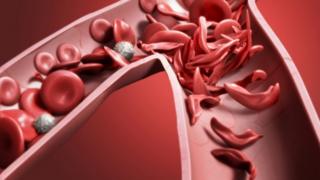Sickle cell disease: Nurses need better training, says health union
 Image copyright
Image copyright
Science Photo Library
Red blood cells with sickle cell disease contain an abnormal form of haemoglobin – the blood’s oxygen-carrying pigment – that makes them sickle-shaped
The NHS needs nurses to be better trained in dealing with sickle cell disease, a union has warned.
The Royal College of Nurses described a poor level of awareness and knowledge in accident and emergency units about the potentially fatal disease.
Sickle cell disease (SCD) is the name for a group of inherited conditions that affect the red blood cells – the worst of which is sickle cell anaemia.
It affects about 15,000 adults and children in the UK.
The union will discuss the issue at its annual general meeting in Glasgow on Sunday, 18 June.
The disease can cause episodes of severe pain known as “crises”, which will kill if not treated correctly.
Despite a higher profile, there are about 5,000 fewer UK patients with cystic fibrosis than with sickle cell.
Stefan Taylor had blood transfusions throughout his childhood to try to help his sickle cell disease
Sickle cell adult specialist nurse Carey Johnson, who submitted the item to the unions’s annual meeting, said: “There are some really good specialist services in pockets around the country, but too many people have to rely on general hospitals and AE, where there is a very poor level of awareness.
“Two things would make a huge difference to the thousands of people with sickle cell disease.
First, provide more specialist services, and, secondly, provide health care staff with better training about the condition.”
Throughout his childhood, Stefan Taylor, 21, of east London, went into hospital on a monthly basis for blood transfusions.
And he would often have to stay in hospital for up to three weeks during severe painful episodes caused by the condition.
He said: “Growing up with sickle cell disease was really hard.
“It affected my personal life because a lot of my friends didn’t understand the disease and didn’t realise why I often couldn’t socialise.
“Hospitals make you better physically, but emotionally they make you worse.
“Some people think you’re addicted to painkillers because you ask for them first thing in the morning.
“It’s very distressing, very upsetting.
“It’s hard to keep calm when you’re in so much pain.”
He also said the specialist units for SCD were “brilliant” but there were only a small number of beds, and the system needed more funding.
‘Very simple’
The Royal College of Nurses also cited a survey carried out in December 2015 by the charity Picker Institute Europe, which asked patients if they thought healthcare staff had a competent knowledge of SCD.
Only 45% of the 229 recipients, who had all received urgent or emergency care within the previous six months, said they felt nurses had a good knowledge and understanding of the condition.
Janet Davies, chief executive and general secretary of the Royal College of Nursing, said: “Nurses are clearly saying that there is not enough training for healthcare staff working in general settings on sickle cell disease.
“People who are already suffering a great deal of pain need the very best, and most informed care.
“The solution to this is very simple: better training and better awareness both amongst health care staff and the public.”
An NHS England official said: “Sickle cell disease can be an extremely debilitating and distressing condition which is why NHS England is committed to providing patients with the highest standards of treatment, care and support.
“Whilst specialist services are central to this, ensuring that local services can respond to the needs of people with sickle cell disease is also vitally important and we welcome all efforts at awareness raising amongst patients and families and all the relevant services that care for them.”
What is sickle cell disease?
Image copyright
Science Photo Library
- Sickle cell disease is a lifelong condition caused by a faulty gene that affects how red blood cells develop
- SCD mainly affects people of African, Caribbean, Middle Eastern, Eastern Mediterranean and Asian origin
- People with sickle cell are often at an increased risk of contracting serious infections or they could become anaemic, which is when red blood cells cannot carry enough oxygen around the body. This can cause tiredness and shortness of breath
- Some patients have regular blood transfusions – usually every three to four weeks – as a form of treatment for the condition
Source: NHS Choices